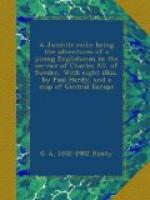“Your reasons are very just, Captain Carstairs. Though certainly my opinion was in accordance with that given by your fellow officers, I am bound to say that your argument seems unanswerable.
“What say you, gentlemen? I have two objects in view—the first to reinforce the garrison of Notteburg, the second to save the troops under my command, if I should fail in doing so. I know the country well, but its features will be considerably altered. Trees will have been cut down, houses levelled, intrenchments thrown up, camps scattered here and there, and I own that in the dark, I might, as Captain Carstairs says, very easily miss my way. I think his proposal therefore unites the greatest chances of getting through their line and entering the town, with a possibility of drawing off the troops without great loss, in case of failure.”
The other three officers at once agreed, and orders were issued for the men to lie down until five o’clock and rest themselves before pursuing their march.
It was past that hour before they were in motion again. Major Sion, with a peasant from the neighbourhood of Notteburg, rode ahead. Then came the troop of cavalry, with the guns close behind them, followed by the infantry. As they approached the Russian lines, the peasant several times went on in advance, and presently a trooper rode down the line, with the order that the troops with firearms were to light their matches, and the spearmen to keep in a compact body.
They were now not far from the Russian lines, and the destruction that had been wrought during the last ten days was visible to them. Every tree and bush had been felled, for use in the intrenchments or for the erection of shelters. A few blackened walls alone showed where houses had stood. Gardens had been destroyed, and orchards levelled.
Light smoke could be seen rising at many points from the Russian fires, and, when the troops were halted, they were but half a mile from the intrenchments.




